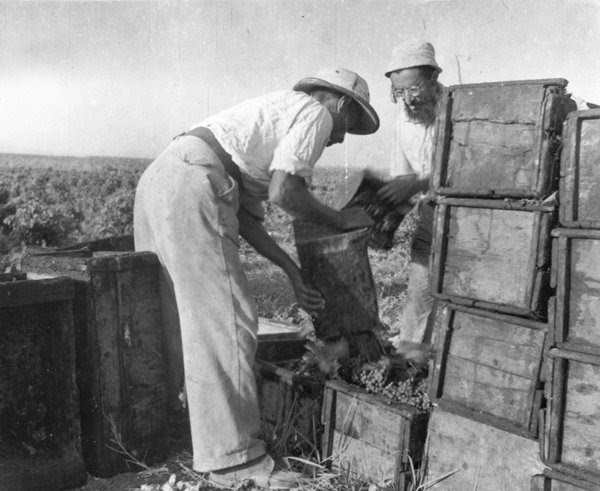
“It was the season when the grapes begin to ripen...” (Num. 13:20)
 Grape harvest (Givat Ada Archives/PikiWiki).
Grape harvest (Givat Ada Archives/PikiWiki).
“It was the season when the grapes begin to ripen...” (Num. 13:20)
Yosef Kfir was embarrassed to be returning to yeshiva so late, but he had little choice.
His parents owned and cultivated a vineyard in Kfar Pines, a religious moshav in northern Israel. Unfortunately, the family was still busy with the autumn grape harvest when the first day of Elul - the start of the academic year in yeshivot - arrived. Yosef’s father requested that he postpone leaving home until the harvest was finished. Two weeks passed before Yosef was able to return to his studies at Mercaz HaRav in Jerusalem.
On his first day back, the young man attended a lecture of the Rosh Yeshiva, Rabbi Tzvi Yehudah Kook. He had hoped that the rabbi would turn a blind eye to his absence, but that was not to be.
As the students sat down around the table, Rav Tzvi Yehudah greeted Yosef and inquired why he was late in returning to the yeshiva. Eyes lowered, Yosef explained that his parents had required his help with the grape harvest. Understood, if not articulated, was the young man’s assumption that the rabbi would recognize the importance of honoring parents, even at the expense of his Torah studies.
Watching this brief exchange, the yeshiva students were surprised to see Rav Tzvi Yehudah jump up and turn to one of the bookshelves. The rabbi quickly located and pulled down a commentary on the Talmud by the renowned Hatam Sofer.1
The commentary analyzed a Talmudic debate between Rabbi Shimon and Rabbi Ishmael in Berakhot 35b. Rabbi Shimon taught that one should study Torah throughout the day, as indicated by a literal understanding of the verse, “You shall meditate in the [words of Torah] day and night” (Joshua 1:8). Rabbi Ishmael, however, disagreed. He ruled that one should combine Torah study with a worldly occupation.
Rav Tzvi Yehudah opened the commentary of the Hatam Sofer and read the text out loud, his voice betraying his excitement:
In my humble opinion, Rabbi Ishmael only asserted that one should follow what it says, “You shall harvest your grain, your wine and your oil” (Deuteronomy 11:14), [even though this will impinge upon time available for Torah study] for those residing in the Land of Israel, at a time when the majority of the Jewish people dwell there. The reason being that, in this case, working the land and producing its holy fruit is itself a mitzvah - the mitzvah of yishuv EretzYisrael, settling the Land of Israel. It was in this context that the Torah commanded us, “You shall harvest your grain.”Thus Boaz [of the Book of Ruth, a leading Torah scholar of his generation], winnowed barley in the threshing floor at night in order to fulfill this mitzvah.
Just as one would not say, “I will not wear tefillin because I am currently busy studying Torah,” so, too, one cannot say, “I will not harvest my crops because I am busy studying Torah.” (Hiddushei Hatam Sofer on Sukkah 36a)
His face shining, Rav Tzvi Yehudah explained the Hatam Sofer’s viewpoint. It is inconceivable that one would decide not to wear tefillin because it takes away time from Torah study. So, too, harvesting the produce of EretzYisrael is a mitzvah. When it is time to harvest, this takes precedence over Torah study!
With his impassioned words, the rabbi relieved Yosef’s uneasiness, raising his spirits. After all, he had been occupied in fulfilling the mitzvah of settling the Land!
Yosef later observed: “On that day I gained a clearer grasp of the connection between my theoretical studies of Torah ‘in the books,’ and our practical, day-to-day life in EretzYisrael.”
Torah and Avodah
Decades later, Yosef’s father became seriously ill. Yosef spent many nights at his father’s bedside. A few days before his death, his father called out in the middle of the night.
What was so vital that he needed to wake up his son at that hour?
His voice weak and unsteady, the old man whispered:
“Do you remember what Rav Tzvi Yehudah told you that day? How he spoke about the holy mitzvah of settling the Land of Israel and harvesting its fruits?”
Yosef’s father was a true pioneer. He fully identified with the “Torah and Avodah” movement, combining the ideals of religious commitment and working the Land of Israel. Up to his final days, Rav Tzvi Yehudah’s words served as the philosophical foundation and the Halakhic basis for his life’s work.

(Stories from the Land of Israel. Adapted from MashmiaYeshu'ah by Simcha Raz and Hilah Volbershtin, p. 247, sent to Arutz Sheva by Rabbi Chanan Morrison, ravkooktorah.org)
See also: The Sin of Tzelofchad
1 Rabbi Moses Sofer (1762-1839), rabbi of Pressburg (Bratislava) and leading Halakhic authority. He is commonly referred to by the name of his most popular work, a collection of Halakhic decisions entitled HatamSofer.




